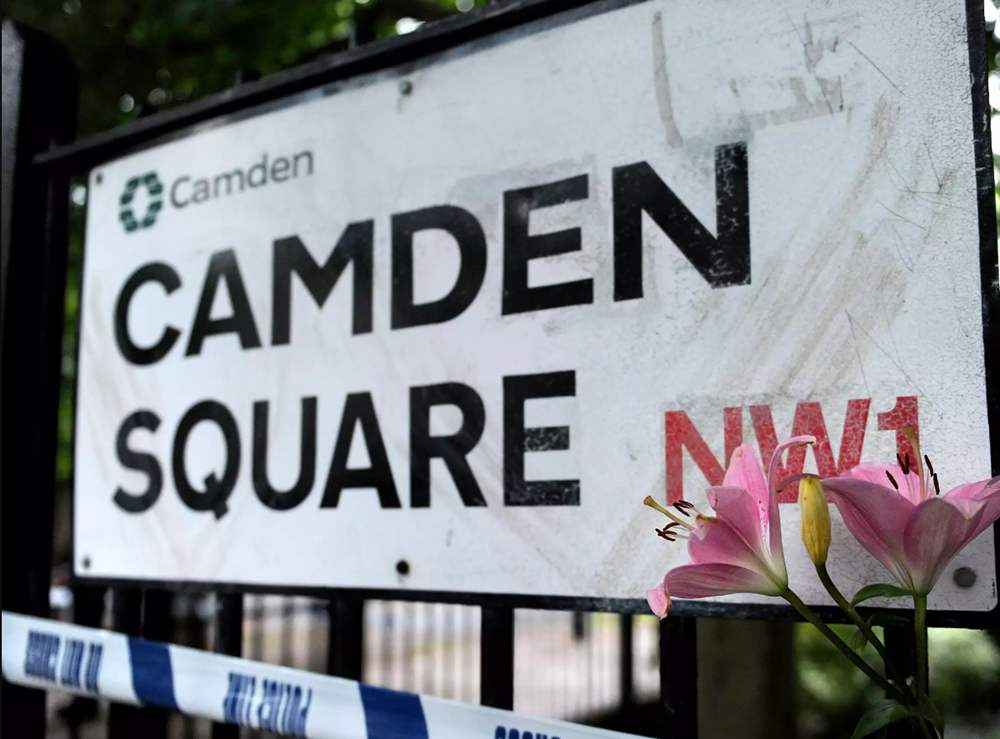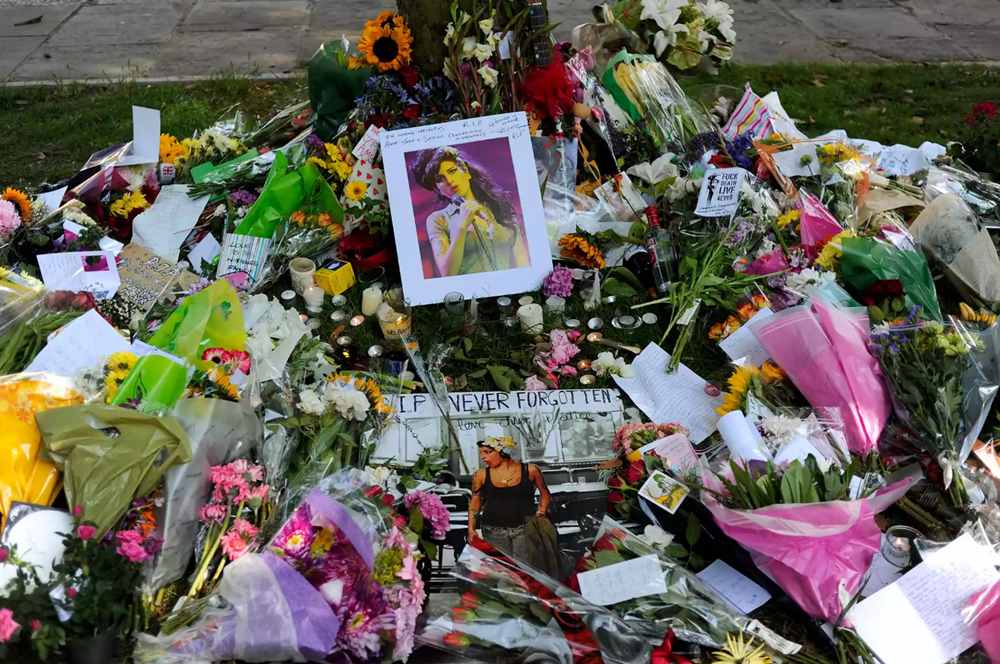Amy Winehouse made a massive mark on the music industry before her career was tragically cut short when she died at age 27 from accidental alcohol poisoning.
The “Rehab” singer shot to fame in her early 20s thanks to her best-selling album Back to Black — but through it all, she was dealing with drug and alcohol addiction and long-term bulimia. While Winehouse spent much of her career trying to overcome her addictions, those closest to the musician said that her life in the spotlight only made her struggles more difficult.
“Amy was a girl in her 20s suffering from addiction, and everybody was a part of it. Everybody was watching it. When you go to rehab, you have to be the strongest you’ve ever been in your life, when you are the weakest you’ve ever been in your life. And she had to go through that in front of people,” Winehouse’s best friend Tyler James told The Times in 2021.
After several trips to rehab and a few near-death experiences, Winehouse was clean from hard drugs in the final years of her life. Although she was also making strides in her recovery from alcoholism, it was an unfortunate relapse that ultimately took her life. 
Winehouse’s parents have continued to honor their daughter’s legacy in the years since her death, including participating in documentaries about her life and establishing a foundation in her honor.
“We always wanted the world to know the real Amy, where she came from and what made her tick,” Winehouse’s father, Mitch Winehouse, told PEOPLE. “She was a loyal, generous friend. She’d help anybody … Just a wonderful human being who saw the best in everybody.”
Winehouse’s legacy will be further explored in the upcoming movie, Back to Black, which is set to hit theaters on May 17, 2024.
So what happened to Amy Winehouse? Here are all the details of her sudden passing.
How did Amy Winehouse die?
Winehouse’s official cause of death was “alcohol toxicity.” At the time of her passing, Winehouse’s blood alcohol level was more than five times over the legal limit. Coroner Suzanne Greenaway ruled it “death by misadventure” and an “unintended consequence” of drinking too much alcohol. After the news was revealed in court, Winehouse’s parents, Mitch and Janis, shared a statement about the death of their daughter.
“It is some relief to finally find out what happened to Amy. We understand there was alcohol in her system when she passed away; it is likely a build up of alcohol in her system over a number of days. The court heard that Amy was battling hard to conquer her problems with alcohol and it is a source of great pain to us that she could not win in time,” her parents said.
Before her death, Winehouse had long struggled with drug and alcohol addiction, though she eventually got clean of heroin and crack. Winehouse’s father said that, in the time leading up to her death, she was the “happiest she has been for years” and had even recently gone three weeks alcohol-free.

“I want people to please, please recognize how hard she had worked to come off drugs and just how close she was to [giving up alcohol] for good, how close she was to being healthy,” Winehouse’s best friend James told The Times.
A second inquest into Winehouse’s death was conducted in 2013 after an investigation concluded that coroner Greenaway didn’t have the correct qualifications for the role, according to the BBC. The verdict was the same as the first inquest: Winehouse died of accidental alcohol poisoning.
When did Amy Winehouse die?
Winehouse died on July 23, 2011. Her exact time of death is unknown; authorities said that she had likely been dead for several hours before she was pronounced dead by emergency workers at 3:54 p.m.
Where did Amy Winehouse die?
She was found unresponsive in the bedroom of her home in Camden, London.
Winehouse’s doctor, Christina Romete, later told the court during an inquest regarding Winehouse’s cause of death that she saw the artist the evening before her death, PEOPLE reported at the time. The physician said Winehouse was “tipsy” but “calm” and coherent and “able to hold a conversation” during the visit. Romete added, per BBC, “She didn’t want to die, she was looking forward to the future.”
The Grammy winner last spoke to her security team around 10 a.m. on July 23, telling them she was going to sleep. Hours later, her bodyguard found her body in bed and called emergency services, who pronounced Winehouse dead around 4 p.m. local time.
“Police were called by London Ambulance Service to an address in Camden Square NW1 shortly before 16.05hrs today, Saturday 23 July, following reports of a woman found deceased,” London’s Metropolitan Police said in a statement at the time.
How old was Amy Winehouse when she died?
Winehouse was 27 years old at the time of her death. She is one of several famed musicians and actors to die at that exact age — including Kurt Cobain and Jimi Hendrix.
What were Amy Winehouse’s last words?
The day before Winehouse’s death, she spent time with her mother. Janis recalled their final conversation during a 2014 appearance on the British TV show, Lorraine.
“Thank God I said, on that day, ‘I love you, Amy,’ ” Janis shared. “And she said to me, ‘I love you, Mummy.’ ”

In the 2015 documentary Amy, the late singer’s bodyguard Andrew Morris also detailed his last visit with Winehouse. The two were watching videos of her performances when Winehouse commented on her vocals, telling Morris that she “would give it back just to walk down the street with no hassle.”
How did the public react to Amy Winehouse’s death?
Winehouse’s death immediately became front-page news. Fans gathered to create a shrine to the singer outside of her London home and held candlelight vigils. Between the fans and media, James told The Times the scene was “like a film premiere.”
Winehouse’s father Mitch appeared outside of the Camden home to thank fans who had created the tribute to his daughter. “I can’t tell you what this means to us. It really is making this a lot easier for us,” he said in a speech. “Amy was about one thing, and that was love. Her whole life was devoted to her family and her friends, and to you guys as well.”
A memorial service was held in the musician’s honor at a synagogue in Edgware, North London, on July 26, 2011. It was attended by 150 people, including her family, bandmates and music executives, as well as producer Mark Ronson and close friend Kelly Osbourne. A spokesperson told PEOPLE that during the service, Winehouse’s father gave a “funny” eulogy, “telling stories about her childhood, [and] people were laughing like a celebration — like they all remembered the stories themselves.”
What legacy did Amy Winehouse leave?
After selling over 16 million copies of her critically acclaimed album Back to Black, Winehouse’s music has continued to be highly regarded throughout the years. Her life has inspired numerous biographies, films and documentaries, like the Oscar-winning documentary film Amy. Both Winehouse’s parents and her best friend, James, wrote their own memoirs reflecting on the singer’s life. Her mother even contributed to the BBC documentary Amy Winehouse: 10 Years On.
“I don’t feel the world knew the true Amy, the one I brought up,” Janis shared in a press release, adding that she hoped the documentary would give the public “an understanding of her roots and a deeper insight into the real Amy.”

Winehouse’s family also helped establish the Amy Winehouse Foundation to help those struggling with substance abuse. In 2016, the foundation opened Amy’s Place, a recovery house that helped women in recovery transition into post-rehab life. The East London facility also offers counseling, exercise courses and relapse prevention groups.
Numerous musicians have also credited Winehouse with having a significant impact on their careers. In 2016, Adele said that she owed “90 percent” of her career to Winehouse. On what would have been Winehouse’s 33rd birthday, Adele shared at a concert that she “picked up a guitar” and began songwriting because of the late singer.
“I’d see her on TV or in magazine shoots with a pink electric guitar and I used to think she was the coolest mother—— on the face of the Earth,” she said. “The songs I got signed on were the songs that I wrote completely on my own — if it wasn’t for her, that wouldn’t have happened. … Her first album, Frank, it really changed my life.”
Winehouse’s story will be depicted in the upcoming biopic Back to Black, starring Marisa Abela as the late singer. Sam Taylor-Johnson directed the film, which will follow Winehouse’s “vibrant years living in London in the early aughts and her intense journey to fame.”

